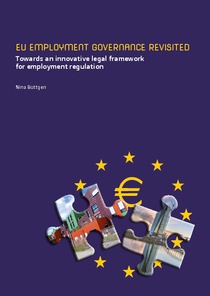-
181Published 2010“…The Post Carbon Reader features articles by some of the world's most provocative thinkers on the key drivers shaping this new century, from renewable energy and urban agriculture to social justice and systems resilience. This unprecedented collection takes a hard-nosed look at the interconnected threats of our global sustainability quandary--as well as the most promising responses. …”
TEXT -
182“…Spain scores second to last in the ‘Labour Market Access’ dimension of the Social Justice Index 2015, with the greatest deterioration among all EU countries compared to 2008. …”
TEXT -
183by Rankin Bohme, Susanna“…Susanna Rankin Bohme tells an intriguing, multilayered history that spans fifty years, highlighting the transnational reach of corporations and social justice movements. Toxic Injustice links health inequalities and worker struggles as it charts how people excluded from workplace and legal protections have found ways to challenge power structures and seek justice from states and transnational corporations alike."…”
Published 2014
TEXT -
184Published 2000“…Written by a team of experienced health practitioners, social scientists and development workers, the volume speaks from both the heart and the mind about the urgent need to prioritize social justice and universal health improvements. Dying For Growth is a 'must-read' for all citizens and activists commited to meaningful change, who believe that health is central to the dignity of the person." …”
TEXT -
185Published 2005“…This edited volume is the first of its kind, providing an analysis of labour relations in this significant industry focusing on multinational corporations and large national companies in ten countries: the USA, Canada, the UK, the Netherlands, Germany, Australia, New Zealand, Singapore, and Russia.The extent to which multinational enterprises impose or adapt their employment practices in differing national industrial relations systems is analysed, Results reveal that the global fast-food industry is typified by trade union exclusion, high labour turnover, unskilled work, paternalistic management regimes and work organization that allows little scope for developing workers' participation in decision-making, let alone advocating widely accepted concepts of social justice and workers' rights."…”
TEXT -
186Published 2012“…These include the 2008 International Labour Conference adoption of the ILO Declaration on Social Justice for a Fair Globalization, which places gender equality at the core of the Decent Work Agenda; the 2009 Conference Resolution concerning gender equality at the heart of decent work, which gives the ILO a 21st century framework for supporting gender-responsive policies in all its activities and programming; the 2010 Conference’s HIV and AIDS Recommendation (No. 200); and its Domestic Workers Convention, 2011 (No. 189) and accompanying Recommendation (No. 201). …”
TEXT -
187Published 2012“…These include the 2008 International Labour Conference adoption of the ILO Declaration on Social Justice for a Fair Globalization, which places gender equality at the core of the Decent Work Agenda; the 2009 Conference Resolution concerning gender equality at the heart of decent work, which gives the ILO a 21st century framework for supporting gender-responsive policies in all its activities and programming; the 2010 Conference’s HIV and AIDS Recommendation (No. 200); and its Domestic Workers Convention, 2011 (No. 189) and accompanying Recommendation (No. 201). …”
TEXT -
188by Büttgen, Nina“…It evaluates whether the joint use of different modes of regulation is as progressive as the competitive-social justice promises the EU’s expansive regulatory framework makes on paper. …”
Published 2017
TEXT -
189“…"Eurofound’s 2016 report Mapping key dimensions of industrial relations identified four key dimensions of industrial relations: industrial democracy, industrial competitiveness, social justice, and quality of work and employment. This report builds upon that earlier study, developing a dashboard of 45 indicators to assess how and to what extent the conceptual framework of these key dimensions can be applied at national level. …”
TEXT -
190Published 2014“…This volume provides a critical discussion of the flexicurity concept, the theories upon which it is built and the ideas that it transmits about work, unemployment and social justice. It shows that flexicurity fosters the further individualization of social protection, an increase in precariousness and the further weakening of labour in relation to capital. …”
TEXT -
191Published 2013“…The book offers new thinking on how interactions between climate change, energy policy, and equity and social justice can be understood and develops a critical agenda for energy justice research…”
TEXT -
192by Fletcher, Bill“…This timely, accessible, "warts and all" book argues, ultimately, that unions are necessary for democracy and ensure economic and social justice for all people."…”
Published 2012
TEXT -
193by Pavilack, Jody“…The patriotic fervor and tragic outcome of the coal miners’ participation in Popular Front coalition politics left an important legacy for those who would continue the battle for greater social justice in Chile in the coming decades."…”
Published 2011
TEXT -
194Published 2009“…In order to examine what kind of policies can produce a positive relationship between social justice and economic efficiency, this book emphasises the need for a holistic approach, which includes not only labour recognised by the market but also informal labour; not only structural factors which shape behaviour but also individual strategies to negotiate positions in society. …”
TEXT -
195Published 2013“…It identifies four key issues which warrant further discussion: (1) the asymmetry of the legal and policy framework of the euro and potential recalibration; (2) substantive tensions between the EU ‘economic constitution’ and its normative aim of social justice and impacts on national policy; (3) the role of civil society, including the two sides of industry in overcoming these tensions and (4) the EU’s global aspirations towards the creation of a viable socio-economic model. …”
TEXT -
196Published 2011“…The problem is multi-faceted, and involves not only technical and policy specific approaches, but also questions of social justice and sustainability. In this volume the editors have assembled a unique range of contributors who together examine the intersection between the science, politics, economics and ethics of climate change. …”
TEXT -
197Published 2011“…Its theory, methods and compelling arguments in favour of social justice are essential for students studying a wide variety of social sciences and policy makers and general readers interested in creating a more socially just society."…”
TEXT -
198by Lens, Sidney“…In Labor Wars, Lens demonstrates how, contrary to conventional wisdom, the struggle of workers for decent pay and conditions on the job, democracy, and social justice has played a far more pivotal role in shaping American life than any president or general. …”
Published 2009
TEXT -
199Published 2017“…"Universal social protection is essential for realizing the human right to social security for all, advancing social justice and promoting inclusive growth, and accelerating progress towards achieving the globally agreed 2030 Agenda for Sustainable Development and its Sustainable Development Goals (SDGs). …”
TEXT -
200by M'Gonigle, G. C. M. (George Cuthberth Mura), -1939“…1936-11 1936 1930s 15 pages produce is entitled to a fair return on his capital and labour, but schemes which increase the price of essential foods, such as milk, butter, eggs, cheese, fish, meat, vegetables and fruit, or limit their production, are contrary to the demands of social justice, and cannot but be reflected in decreased consumption, by the poor, of foods of which they already have too little. …”
Published November 1936












